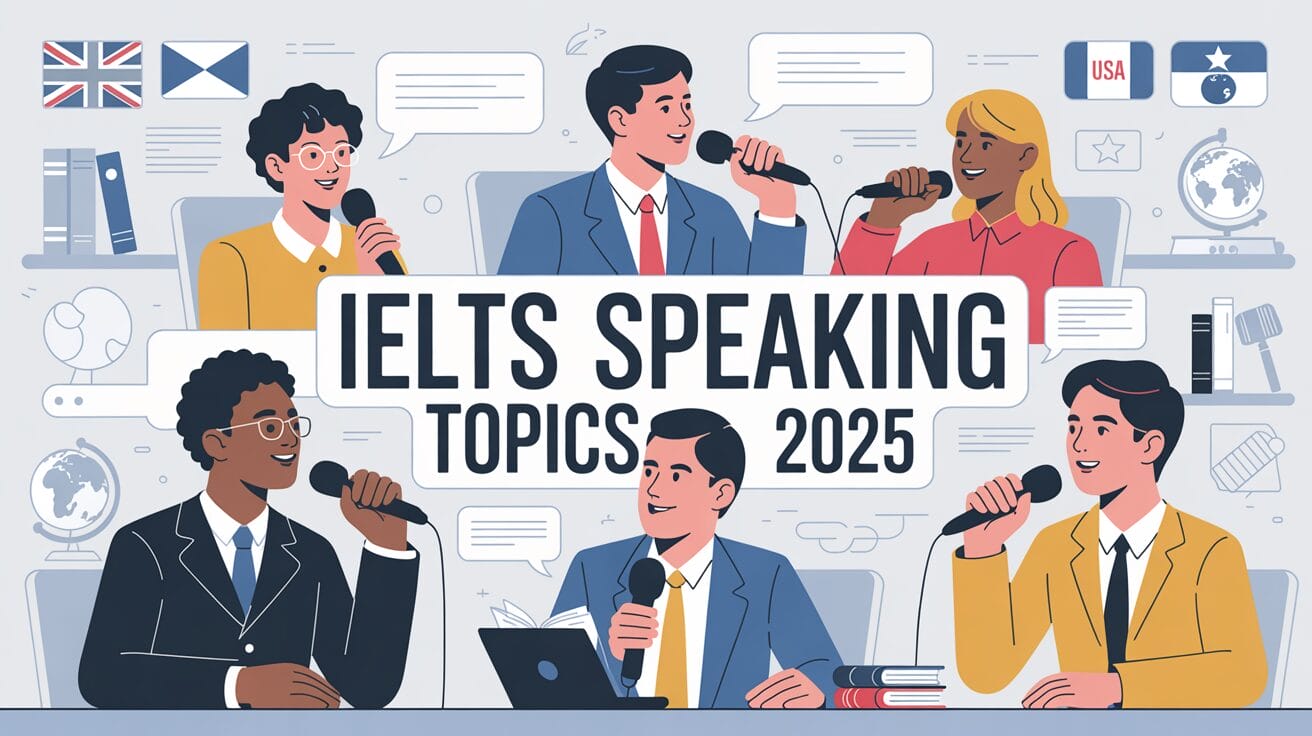
most crucial parts of the exam. For many students, it feels intimidating—face-to-face with an examiner, being judged on your fluency, vocabulary, and confidence.
But here’s the good news: the IELTS Speaking test is highly predictable. Questions repeat in themes like hometown, work, hobbies, technology, environment, and travel. By practicing these topics with high-quality answers, you can walk into the test prepared, confident, and ready for Band 7+.
In this blog, we’ll cover:
Whether you’re taking the Academic or General IELTS, this guide will help you prepare smarter.

The IELTS Speaking test is a face-to-face interview lasting 11–14 minutes, divided into three parts:
The format has not changed in 2025, but recent examiners’ reports show more focus on technology, environment, education, and social change topics.
Here are the common IELTS Speaking Topics you’re most likely to encounter in 2025:
Pro Tip: Don’t memorize answers word-for-word. Instead, practice structures, linking phrases, and key vocabulary so you can adapt to any question.
I come from Nadiad, a city in Gujarat. What I like most is the balance between tradition and modern lifestyle. The city is known for its educational institutions, and at the same time, it has a very close-knit community where people celebrate festivals together. I think this sense of belonging makes it unique.
I personally prefer studying in the morning because my mind is fresh and I can concentrate better. I also feel that I’m less distracted at that time compared to evenings when there are more social activities or family responsibilities.
Yes, I use social media daily, especially Instagram and LinkedIn. While Instagram helps me relax and connect with friends, LinkedIn is useful for professional networking. But I try to limit my time because it can be addictive.
Tip: Keep Part 1 answers short and natural (2–3 sentences). Don’t over-explain.
You’ll be given a cue card. Let’s look at some 2025 trending topics.
One book I recently read is Atomic Habits by James Clear. My friend recommended it when I was struggling with time management. The book explains how small daily changes can bring big improvements in life. What I liked most were the real-life examples that made the concepts practical. I would recommend it because it is not only about productivity but also about creating a healthy lifestyle. It really inspired me to take consistent action instead of waiting for motivation.”
● What the technology is
● When you started using it
● How it helps you
● Why it is important to you
I would like to talk about Google Maps. I started using it around five years ago, and since then it has completely changed the way I travel. It helps me find the best routes, avoid traffic, and even discover new places. Before this, I used to rely on asking strangers for directions, which was sometimes confusing. Now I feel more independent and confident while traveling, even in new cities. It saves me time and reduces stress.
● What the tradition is
● How it is celebrated
● Who takes part in it
● Why it is important
One important tradition in India is Diwali, the festival of lights. Families decorate their
homes with lamps and candles, exchange sweets, and burst fireworks. Almost everyone, regardless of age, takes part in the celebration. It is important because it symbolizes the victory of light over darkness and good over evil. Beyond the religious aspect, I think it brings communities closer and strengthens social bonds.
Here the examiner asks more analytical, abstract questions.
I believe technology has made communication faster and more convenient. For example, video calls allow people to stay in touch with family abroad. However, it has also reduced face-to-face interaction, which sometimes weakens personal connections. In my opinion, the key is balance—using technology without losing human touch.
Tradition plays a crucial role in shaping identity and values. However, society is evolving, so traditions should also adapt. For example, celebrating festivals sustainably, without harming the environment, shows how old practices can merge with modern thinking.
I think both are important, but in today’s world, practical skills are slightly more valuable. Employers often look for candidates who can apply knowledge in real situations, not just memorize theories. That said, theoretical knowledge builds the foundation, so the two should complement each other.
The IELTS Speaking test in 2025 focuses on familiar topics like technology, environment, traditions, and personal experiences. By practicing with these sample questions and Band 7+ answers, you’ll feel more confident and prepared.
At AEOC, our IELTS Coaching in Nadiad, Anand, and Vallabh Vidyanagar gives you
personalized speaking practice with real exam simulations, AI feedback, and expert
guidance.
Book your free demo class today and get one step closer to your dream IELTS band
score.
